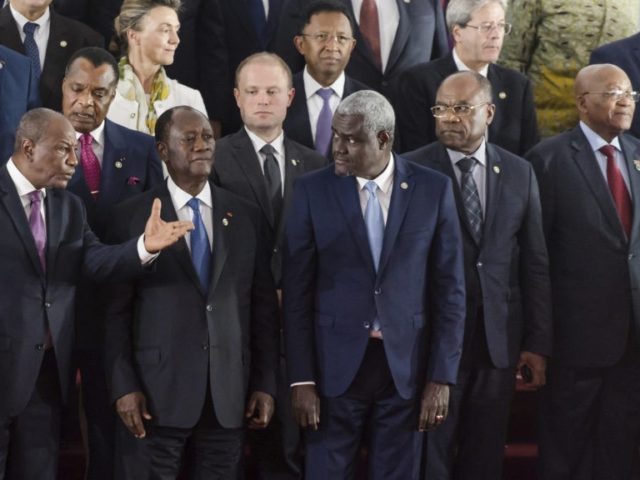A disputed derogatory remark about the poor state of African countries attributed to U.S. President Donald Trump during a recent private Oval Office meeting sparked a global political, diplomatic, and media firestorm.
Regardless of what may or may not have been said, the incident serves as a catalyst for inquisitive minds to put some much-needed sunlight on that continent’s many problems.
The African Union – which represents 54 African member nations – immediately demanded the president retract his comment and apologize not only to Africans but to all people of African descent around the globe, even though he disputed what was reportedly said along with several others in the meeting. It should not go unnoticed that the Union’s founder is Libya’s late dictator Muammar Gadhafi – and that the organization has colossally failed in its goal to seek “an integrated, prosperous and peaceful Africa, driven by its own citizens and representing a dynamic force in global arena.”
In reality, centuries of torment didn’t end for most African people after they forced European colonialists to relinquish power in the mid-20th century. Venal African leaders quickly filled the vacuum and have done little to develop their societies or emancipate Africans from their horrid existence despite vast continental riches. Worse yet, many of these leaders have enriched themselves at the expense of their countries by confiscating large amounts of wealth generated by private enterprises and foreign aid.
Freedom House (a global freedom watchdog) addressed Africa’s problems in an earlier report, laying the blame on kleptocracies, military dictatorships, and single-party personalistic regimes dominating political systems and perpetuating the cycle of violence and debilitating poverty. Its 2018 Report on Global Freedom discloses that only 10 percent (126.3 million) of Africa’s 1.2 billion residents live in freedom with the same political rights and civil liberties accorded to Free World citizens.
Some startling facts emerge when one compares the conditions of Africa’s 1.2 billion residents to the 6.2 billion who populate other parts of the world. According to data contained in CIA World Factbook, the average lifespan of Africans is 57 years, versus 71 years elsewhere. Africa’s GDP is $4,938 per capita (distributed disproportionately between the well to do and the downtrodden), compared to the rest of the planet’s $18,437. And Africa’s illiteracy rate is 37 percent, more than 4 times greater than the illiteracy rate of 9 percent for the world’s other residents.
The relatively short lifespan of Africans is attributable to civil wars, genocide, and anarchy that have plagued the continent for decades. Angola, Congo, Libya, Mozambique, Nigeria, Rwanda, Somalia, and Sudan exemplify the madness that has killed, displaced, and terrorized tens of millions. Disease is also a main factor, with the CIA World Factbook reporting some 945 million people in 36 African countries having a very high risk to major infectious diseases.
The U.S. State Department’s 2017 Trafficking in Persons Report provides more grim news for those who think slavery is a thing of the past. The report reveals that modern slavery (compelled labor and/or sex trafficking) is present in all 54 African countries, with 15 of them doing very little about it. In addition, Libya and Somalia are among the world’s worst practitioners of modern day slavery. Many of those captured in slavery’s web are migrants looking for better lives away from their birth country.
The U.S. State Department’s Annual Terrorism Report for 2016 shows how the scourge of radical Islamic terrorism has also gripped the African continent, with 15 such terror groups operating there. They include the notorious groups Al-Qaeda; Al-Shabaab; Ansar al-Sharia; Boko Haram; and the Islamic State. These groups gestate and gain sympathy in most areas where Islam flourishes. Notably, Islam’s growing population now accounts for about 43 percent (523 million adherents) of Africa’s population since the first Muslims arrived in the continent during the 7th century.
The U.S. has made substantial efforts to assist the African people in coping with these problems since independence. It has diplomatic representation in nearly every country; contributes the greatest amount of its economic and development aid to that region; and has about 6,000 troops posted there to enhance security. In recent years, the U.S. has reportedly doubled the number of African immigrants entering the United States. In addition, one estimate pegs Western nation investments at over $1 trillion for African development since its independence.
The African Union, United Nations, and others act as though President Trump’s alleged obscene description of African countries is worse than the vicious cycle of oppression, war, terrorism, genocide, poverty, illiteracy, slavery, and disease that has plagued the continent for far too many years.
The tens of millions of African lives that have been lost, displaced, or ruined because African leaders haven’t put the welfare of their people first, and that many of the organizations and programs created to benefit the long-suffering African people have failed, are clearly worse than a simple descriptive adjective.
President Trump’s critics should be mindful that long-standing African problems pre-date his presidency. Moreover, they should appreciate his most sacred obligation to the American people in keeping them safe and asking honest and hard questions about the potential security and health risks posed to Americans by immigrants (legal/illegal) entering the United States from dangerous parts of the world, including Africa.
Hopefully, the day will come when the African people are able to live in freedom, peace, harmony, good health, and realize the continent’s enormous potential. And when that day comes perhaps Africans may decide to thank President Trump for bringing much-needed attention to their current plight.
Fred Gedrich is a foreign policy and national security analyst. He served in the U.S. departments of State and Defense and extensively traveled to Africa on official assignments.

COMMENTS
Please let us know if you're having issues with commenting.